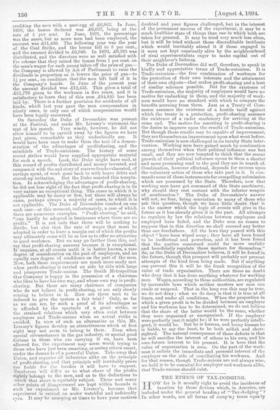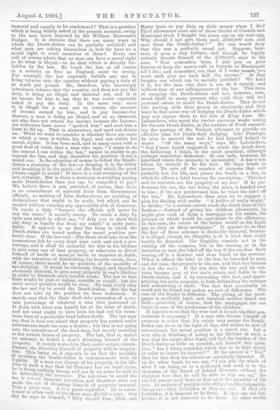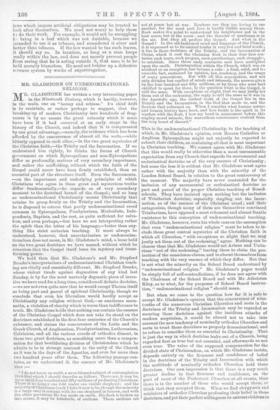THE ETHICS OF TAX-DODGING.
HOW far is it morally right to avoid the incidence of taxation by those devices which, in America, are included under the general heading of " Tax-dodging " ? In other words, are all forms of escap'n3 taxes equally immoral and equally to be condemned? That is a question 'which is being widely asked at the present moment, owing to the new taxes imposed by Sir William Harcourt.'s Budget. It is obvious that there are many ways in which the Death-duties can be partially avoided ; and what men are asking themselves is, how far have we a moral right to avail ourselves of them ? Every one will of course admit that no man can have a moral right to do what is illegal,—to do that which is directly for- bidden by the law. To break the law, at all events in a country as free as England, must be wrong. For example, the law expressly forbids any one to bring tobacco into the country without paying a duty of so much per pound. Fie, therefore, who knowingly introduces tobacco into the country, and does not pay the duty, is doing an illegal and immoral act, and it is no excuse for him to say that he was never expressly asked to pay the duty. In the same way, since it is illegal for a man not to return the amount of income earned by him, and to pay Income-tax thereon, a man is doing an illegal, and so an immoral, act who does not return his income because the Income- tax collectors have never "spotted him" and sent him.a form to fill up. That is elementary, and need not detain us. What we want to consider is whether there are cases in which a man is within his legal, and not within his moral, rights. It has been said, and in many cases with a good deal of truth, that a man who says, " I mean to do the utmost I can within the law," means in reality to go beyond the law, and that therefore his position is not a moral one. Is the adoption of means to defeat the Death- duties a straining of the law—a keeping it in the letter and breaking it in the spirit—of the kind which the good citizen ought to avoid ? If there is a real straining of the law, certainly. But is there a straining in avoiding paying more Death-duties than you can be compelled to pay ? We believe there is not, provided, of course, that there is no concealment of material facts from Government officials, no making of false declarations, no avoiding of declarations that ought to be made, but which can be evaded without running any appreciable risk of discovery. To evade a duty "because the officials will never be any the wiser," is morally wrong. To evade a duty by open acts which in effect say, "I defy you to show that any duty is legally due from my estate," is quite justi- fiable. It appears to us that the form in which the Death-duties are levied makes the moral position per- fectly clear. If the law said—The State shall take from the possessions left by every dead man such and such a per- centage, and it shall be unlawful for him in his lifetime to give away any of that property, or otherwise to divest himself of lands or moneys liable to taxation at death, with the intention of diminishing his taxable estate, then, of course, there would be no question of the morality of tax-dodging. It would be obviously illegal, and therefore obviously immoral, to give away property in one's lifetime in order to diminish one's taxable estate. The law in that form might be just or unjust, sensible or stupid ; but the strict moral question would be clear. No man could obey the law and try to avoid the Death-duties. But the law does not take up the position we have indicated. It • merely says that the State shall take possession of a cer- tain percentage of whatever a man dies possessed of. It deals with what was legally his at the hour of d. eath, and not what ought to have been his had not his inten- tions been of a particular kind before death. The law may say that it does not admit that property has passed under instruments made too near a demise ; but this is not going into the intentions of the dead. man, but merely counting as his certain forms of property. The law, that is, makes no attempt to forbid a man's divesting himself of his property. It merely warns him that, under certain circum- stances, the divesting himself of property will be inopt.ra- tive. This being so, it appears to us that the morality olf avoiding the Death-duties is commensurate with its e.gality. If a man can dispose of his property in his life- time in such a way that the Treasury has no legal claim, he is doing nothing wrong, and can in no sense be said to be d.efrauding the revenue. The intention to avoid the tax is not an immoral intention, and therefore does not make the act of divesting himself of property immoral. Take a plain case. A is a great capitalist. He is accus- tomed to allow each of his three sons X3,000 a year. One day he says to himself, Why should Tom,' Dick, aud Harry have to pay duty on their money when I die? Their allowances come out of those blocks of Consols and Municipal stock I bought ten years ago as my nest-egg. Why should I not give them each £100,000 now, and save them the Death-duties ? " No one would deny that this was a perfectly moral act. Suppose, how- ever, A goes a step further, and though he legally entirely divests himself of the £300,000, says to his sons, " Now remember, boys, I put you on your honour to keep the money safe in Console or Municipals till I die ; and remember, too, that if I come smash, you must each give me back half the income." Is that bargain one which can be morally justified ? We hold it is, for the man who does it can do it openly, and without fear of any infringement of the law. This form of escaping the Death-duties will not, however, com- mend itself to many persons who wish their real and personal estate to avoid the Death-duties. They do not like parting with their money so absolutely, and they want to find some way of dodging the Death-duties which may not expose them to the fate of King Lear. Mr. Labouchere, who spent the twelve previous weeks voting for the new Death-duties, in the number of Truth succeed- ing the passage of the Budget, attempts to provide an effective plan for Death-duty dodging. Like Penelope, he tries to unravel the web he had himself helped to weave. "Of the many ways," says Mr. Labouchere, that I have heard suggested to evade the death dues, the following, I think, is the most practical, although perhaps somewhat dishonest. It can only, however, be practised where the property is personalty. A has a, son whom he intends to be his heir. He buys bonds to bearer. He cuts off the number of coupons that will probably last his life, and places the bonds in a box, to which he affixes a label bearing the inscription : 'This box and its contents are the property of ray son.' If he pre- deceases his son, the box being the son's, is handed over to him ; if the son predeceases him, he tears the label off the box." Mr. Labouchere then goes on to suggest a, plan for dealing with realty. "A holder of realty might," he thinks, "to a certain extent evade the death dues in. this fashion :—Instead of giving his children allowances, he might give each of them a mortgage on his estate, the interest on which would be equivalent to the allowance. In this case, the estate of the father would on his death pay no duty on these mortgages." It appears to us that the first of these schemes is distinctly immoral, because it is illegal, though the illegality is of a kind that could hardly be detected. The illegality consists not in the cutting off the coupons, but in the tearing, or in the intention to tear, the label off the box if the son dies. Such tearing off is a distinct and clear fraud on the revenue. When A. affixed the label to the box, he intended to pass, and did pass, the property to his son, and that box became in law the son's. If the son dies, the box and its con- tents become part of the son's estate, and liable to the Death-duties, and A by concealing this fact, and appro- priating his son's property, is both defrauding the revenue and committing a theft. The fact that practically he could not be found out makes no sort of difference. The case of the Squire is different. The giving of the mort i - gages s perfectly legal, and involves neither fraud nor theft7provided, of course, that the mortgages are not burnt in case of the predecease of the children.
It appears to us that the true test is to ask whether con- cealment is necessary ? If a man who divests himself of property in order that his estate may escape the Death- duties can do so in the light of day, and makes no sort of concealment, his moral position is a sound one. Let a man who is thinking of acting in his lifetime in such a way that his estate after death will feel the burden of the Death-duties as little as possible, ask himself this ques- tion, "Am I doing anything which has to be kept secret in order to insure its success ? " If the answer is "Yes," then let him drop his scheme as essentially immoral. If, on the other hand, he can say, "I can put the whole of what I ant doing on to a post.card, and send it to the chairman of the Board of Inland Revenue, without the slightest fear that lie will be able to trip me up," the can ful parent need have no fear as to the morality of his acts. In matters of positive civic obligation like taxpaying, things are either forbidden or they are not. If they are forbidden, it is immoral to do them. If they are not for- bidden, it is not immoral to do them. In other words, laws which impose artificial obligations may be trusted to look after themselves. We need not worry to help them to do their work. For example, it would not be smuggling t> bring in a leaf which was not dutiable, because we intended to use it as tobacco, and considered it nicer and better than tobacco. If the law wanted to tax such leaves, it should say so. In taxation, as long as a man keeps really within the law, and does not merely prevent people from seeing that he is acting outside it, that mau is to be held morally blameless. He need not bolster up a defective revenue system by works of supererogation.




































 Previous page
Previous page